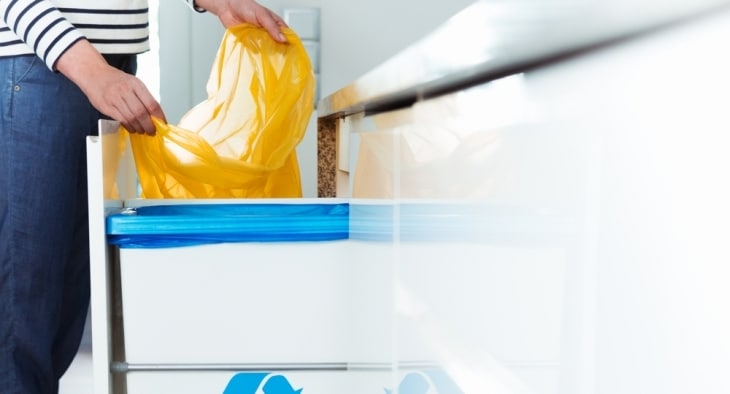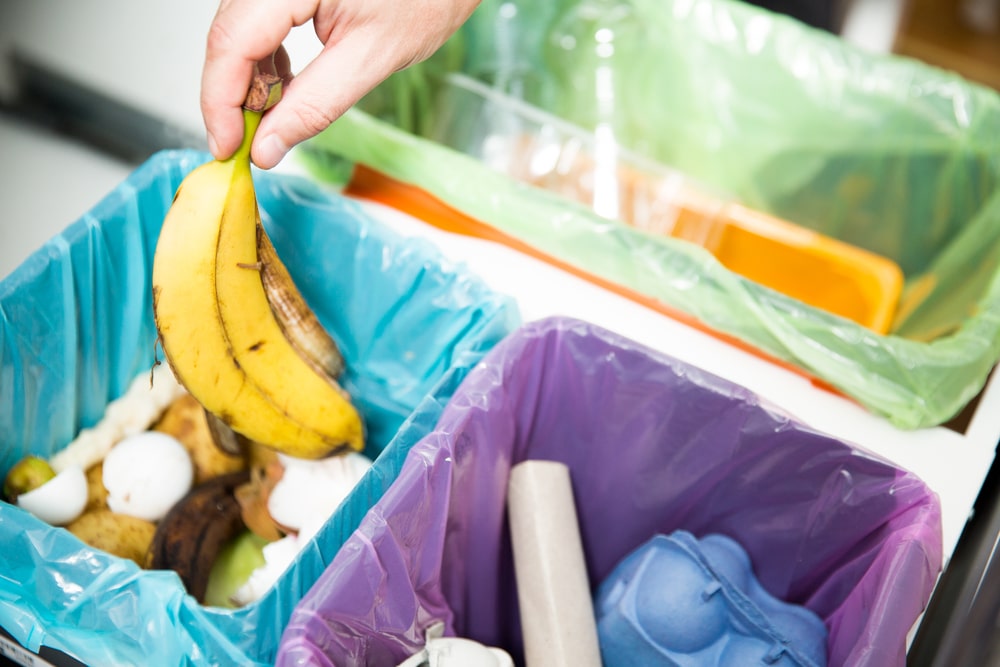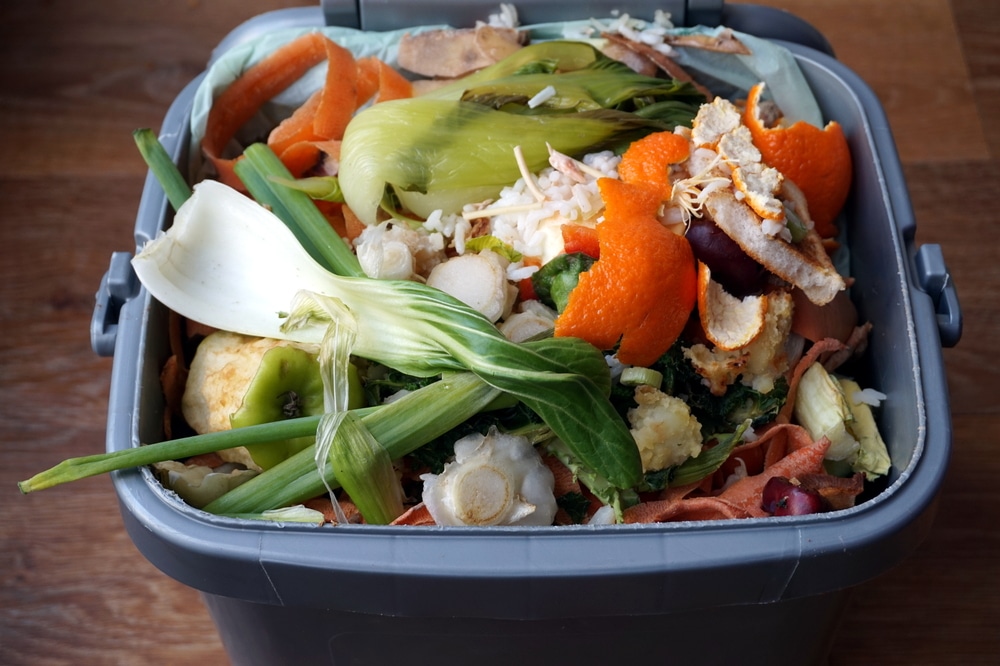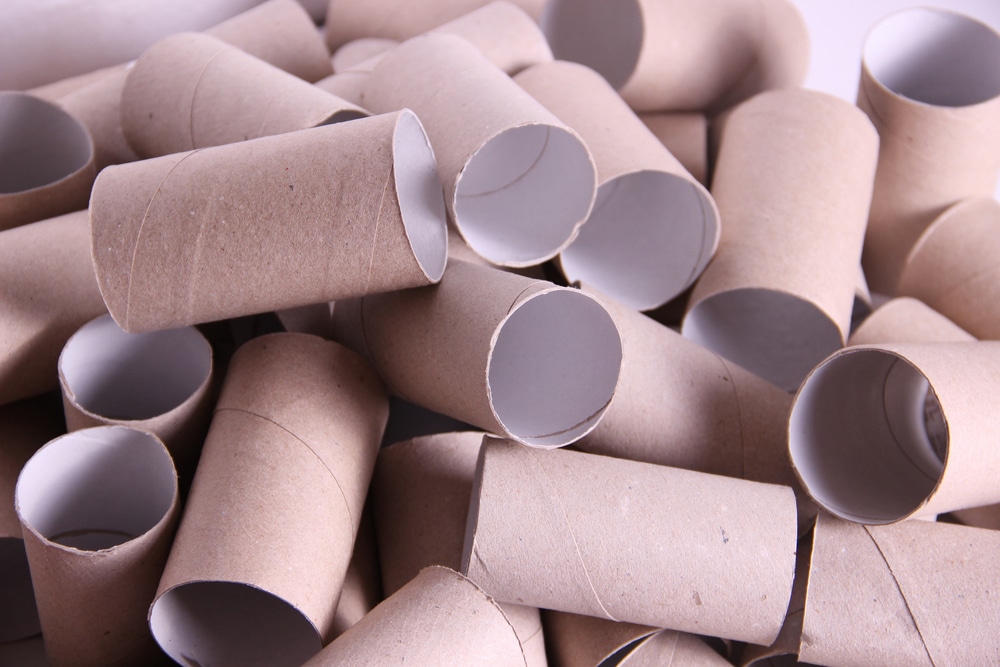Jasmine Birtles
Your money-making expert. Financial journalist, TV and radio personality.


It’s a new year and the perfect opportunity for a fresh start. If being more serious about recycling is one of your resolutions for 2018, we’ve got some good news: being more mindful about the contents of your rubbish bin could even make you some money!
From selling toilet rolls on eBay to starting your own composting business, there are loads of ways to make a bit of cash on the side.
Since it may seem somewhat overwhelming, we’ve done the research to help you ease into this new approach.

The best way to reinvent the refuse system in your home is to have a diversified approach to rubbish. What does this mean? Basically, instead of tossing everything into one bin, have a few different containers dedicated to different items.
Here are a few ideas:
If you live in an apartment and wish to do something more useful with your potato peels, cucumber offcuts and apple cores than toss them out with all your other rubbish, why not invest in an indoor composting bin?
There are a number of ways to go about this, but if easy and un-gross is what you’re after, we highly recommend bokashi.
This Japanese method of composting makes use of bran containing effective microorganisms to rapidly break down a wide range of food waste – from plant-based leftovers to meat and bones.
While it may sound like a messy business, bokashi bins are surprisingly odourless and generally inoffensive. The compost from your bokashi bin comes in ‘juice’ format (also known as tea) and normally requires dilution before use. So, a little bit goes a very long way!
If you don’t have a garden/pot plants of your own to use it on, you could always bottle a few batches (already diluted) and sell to neighbours and friends. Do keep in mind that the juice should be used within 24 hours.
Alternatively, bokashi tea can be used as an eco-friendly means of clearing organic matter from blocked drains.
Since you will probably find that most of your rubbish takes the form of plastic, glass and cardboard containers, it’s worth having a large bin in the kitchen for these items. Before tossing them in there, however, give each container a good wash to keep everything as clean and fresh as possible.
If you have a home study, this could offer the perfect space to install a paper recycling station. Have one box for scraps you can use again and another for all paper to be recycled.
Collect smaller items such as wine corks, pull tabs and ink cartridges in a range of containers suiting their size. Having a dedicated container for each of these items makes remembering to separate them from other rubbish easier and also helps keep your spaces neat and tidy.

While we touched on bokashi composting for apartment-dwellers earlier on, those with backyards have the clear advantage of space for more extensive operations.
So, if you’ve been converting your own organic waste into compost for a while now, here are a few ways you can make money while you’re at it:
While people may have good intentions, very few actually end up investing the required time and energy into composting. This means there’s a whole market of people who would just be too grateful if someone else offered to help them get rid of their compostable rubbish.
Start small by collecting organic waste from your closest neighbours once a week. You probably won’t require much more than a wheel barrow to transport the various buckets/bins to empty out onto your own compost heap, which means your overheads will be practically non-existent. So, if you charge even a small fee of £5/month per household, you’d be able to make a nice profit.
If your neighbours are happy with your services, you may soon find yourself branching out to other parts of your area due to word-of-mouth recommendations.
If you offer your services to five or six neighbours at £5/month per household, you could have £30 extra in your pocket each month. Not bad at all for removing other people’s rubbish!
With the addition of your neighbours’ organic waste, you will be able to produce a lot more compost more quickly. So much so, you might not know what to do with all of it after a while.
If you reach a point of problematic excess, you could always mix your compost with top soil, package it in 2 – 5 kg batches and sell it to small local nurseries. Do keep in mind that nurseries may require your compost to be certified for quality purposes.
Sound like a bit of a rigmarole? You can – once again – sell your compost to your neighbours, instead. Perhaps you can even work out an arrangement where a number of bags of compost is included in the collection price mentioned above.
Nurseries normally sell compost for between £3 and £10 per bag, depending on the size. This means that you would probably charge between £0.50 and £7 per bag for your product, depending on the size and quality.
With an ever growing interest in organic and eco-friendly lifestyles, more people are keen to learn about things like composting. While this might sound strange to someone who just considers composting a normal part of everyday life, you could cash in on it by offering training for a small fee.
Start off by inviting those who have shown interest in your compost heap to a free workshop or two and ask for their honest feedback. Do a few more practice runs with friends and family and then start advertising your composting classes!
Composting classes are a rather common phenomena across the UK and many of them are offered free of charge. So, if you want to make money from this, you should consider throwing in a few extras to make it more attractive to your students. This could include course notes (preferably sent via email), a packet of compost to take home or a small starter kit.
The price you charge will depend on how much you spend on the extras (if anything), but anything more than £7 per person per class will probably be considered a little too expensive by most.

Now that we’ve dealt with your organic waste, it’s time to turn our attention to the other rubbish that could be converted to cash!
Yes, you read that correctly! Toilet roll inners have proven to be a hugely popular commodity among crafting enthusiasts.
Make an effort to collect these little brown tubes and then sell them in bulk on eBay, Gumtree or even Facebook.
Find out more by reading our article on making money from your old toilet rolls.
Instead of tossing your used ink cartridges into the rubbish bin, you can send them off free of charge to be recycled… and also get paid for it!
There are a number of companies offering this service across the UK, but The Recycling Factory seems to receive consistently good reviews from clients.
Depending on its rarity and whether it’s ‘virgin’ or not, you can expect to receive anything between £0.30 and £3 per cartridge.
Love taking on sewing projects, but hate the fabric scraps that inevitably stay behind? Good news – instead of hoarding them in your craft cupboard, you can earn some extra cash by selling them on eBay!
The best way to go about this is to cut them into neat scraps of relatively equal sizes and then package them in bundles of 10, 20, 30 etch or by weight.
The average price for 20 pieces of fabric is about £3, but you can even charge up to £5.50 if it’s really good quality or somewhat rare.
If you’re fond of drinking canned beverages, start collecting them in a separate container to your plastic and glass. Once you’ve managed to gather a substantial amount, you can drop them off at a Cash for Cans plant and receive some money in return.
You can expect to earn between 40-50p per kg. So, it’s an ideal additional income stream for those who run their own café/restaurant or have lots of people to help them out.
Before recycling your cans for cash, however, remove the pull tabs on top and place them in a separate container. Once you’ve collected a couple of hundred, you can sell them on eBay.
The only catch here is that you really do need to collect quite a lot before you can put them up for sale, so enlist help from family members and friends.
The going rate on eBay seems to be about £12 for a thousand.
Not sure what to do with all the jars left in the wake of your jam addiction? Well, one thing is certain – DO NOT put them out with the rubbish. Instead, clean them thoroughly, remove labels and keep them safe. Once you’ve collected a dozen or so, you can sell them on Gumtree, eBay or Preloved.
The average price on Gumtree is about £3 for 12 used jam jars.
Used wine corks are yet another unlikely item hugely popular among crafters on eBay. So, once you’ve popped open your Chardonnay, best drink up and stash the cork away for a new wine fund!
The going rate is about £20 for 200 corks.
As you can tell from all the items listed above, you’re probably not going to make a fortune from the contents of your rubbish bin. However, if you work smartly and commit to the cause, you could make a steady extra income that could even be channelled into a specific dream or project.
Although Jessica Renz from TheRenzNest doesn’t necessarily make money from recycling, her blog about zero waste living can be an inspiration to anyone who wants to rethink their rubbish.
Passionate about the environment, Renz started cutting down on the use of plastic as a sort of experiment/hobby, sharing her experiences online. Without even trying, she soon found herself to be an authority on the topic of waste, as well as an inspiration to many.
“To make this easy for everyone else who is interested in minimising their waste and cutting back on plastic, I have devoted myself to be your guinea pig. I have tried and tested plenty of products throughout the house and talk about them here,” she writes on her About page.
If you’re struggling to feel motivated about recycling and sorting out your rubbish, take some time to scroll through TheRenzNest.


Thanks For sharing this information. It’s Nice..!!!
Making your own compost would be very useful.
I saved up bits of scrap metal a few years ago and after saving what I thought was a large amount I took it to the scrap yard to be weighed in and made about £3. my husband thought that it probably cost me the same in petrol taking it and it wasn’t worth the small return but I like to think that it made me money and helped save mother earth.
yes, we need a lot more incentives to recycle. Well done you for taking some to the scarp yard!